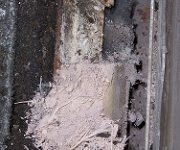Once I went camping with some friends outside Bella Coola, in a beautiful spot, up a logging road – also known as a “resource road,” used by industry. The mountains, water, forest, and fresh air were amazing, but when a fully loaded logging truck thundered by, I got pretty worried.
Category: Personal stories
A construction employer once told me about an attitude he sees on worksites. “People really don’t pay attention to how dangerous the industry is,” he said. “I see it all the time. It’s a leftover cultural thing where, to some degree, there’s almost a pride in avoiding some of the basic safety standards that are out there.”
In the 1990s, my brother Bob worked in the Vancouver film industry as a production assistant. He told me about an experience that makes me angry to think about because it’s so dangerous. Thankfully he wasn’t hurt, but it’s still a good example of worst practices.
Here’s a story from a former care aide attendant who worked in a group home for young and middle-aged adults. Residents at the group home lived with cognitive and physical disabilities, mental illness, and dual diagnosis (i.e. addiction and mental illness together).
Years ago, Christine was working at a car dealership when she walked outside and found two coworkers in danger of electrocuting themselves.
Up to 16 Americans die at work each day and the United Support and Memorial for Workplace Fatalities formed to remember them and lobby for improved safety conditions.

In the 1970s a UK man was given a hammer and a damp cloth to cover his mouth. His foreman said to smash down an old ceiling made of asbestos boarding. “My how things have changed!” he wrote.
Paralympic medalist Josh Dueck high-fived 9,307 people last summer, winning a Guiness World Record, to raise awareness of young worker safety. Now WorkSafeBC has entered a video about Josh’s high-five record in the Boston College Center for Corporate Citizenship’s Film Festival 2011.
A friend of mine – who I’ll call Jane – announced half-jokingly on Facebook that she “failed her graduated RTW.” I followed up and learned she had tried to do an early return-to-work (RTW) program, but was held back by pain.
“There are some things you can’t un-smell,” said Geoff Shellard, project manager at Bio Solutions, a Coquitlam-based company on call 24/7 for cleaning up crime-trauma scenes, stolen and recovered vehicles, clandestine drug lab damage, and many more unusual situations around BC.


